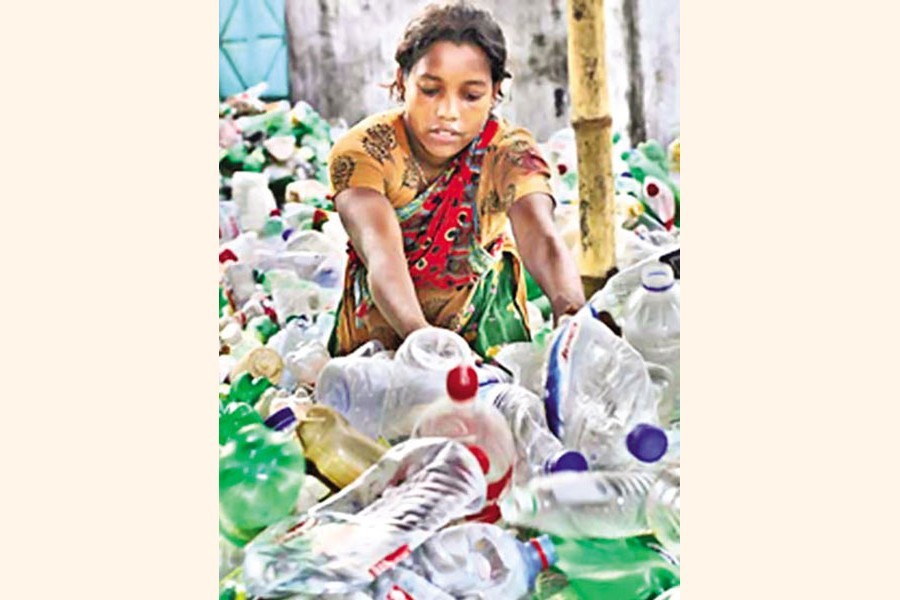A news report published recently in the FE has homed in on 44 global and local entrepreneurs for the fast-spreading plastic menace in the country. These entities include 33 local parent companies and 11 international ones. The latter include industrial behemoths running businesses worldwide. The report has a catch. The popular belief normally absolves the foreign companies of any wrong-doing due to their source-countries being highly vocal on the issue of plastic pollution. Few in society appear to have delved into the issue, specifically the impact of the plastic containers of food and other essential products on the environment. The most destabilising aspect of using these containers is the seepage of their tiny particles into the people's day-to-day food chain. The users of the products contained in eye-catching bottles and containers of different shapes can hardly think of any risks posed by these plastic products. Even when they are dumped into garbage bins, landfills etc or are littered to remain open to attacks by the elements, they continue to cause physical harms to unwitting humans.
Ironically, it is only the locally manufactured plastic containers which have to take the blame wholesale. It is not known whether tests on the edible product-carrying containers are made regularly to ascertain their food-grade status or their biodegradability. Had they known about the overseas plastic products' 'superiority', the rag-pickers or vagabonds would have kept them aside for sale after washing and cleaning. And they would fill their sacks with the containers of local products only. Despite the recycling sector's putative high prospects, only a small portion of the discarded plastic goods is collected by the small local recyclers. Apparently, these factories lack the state-of-the-art technical backing. They manufacture a small number of the recycled plastic objects against huge demands. The products are mostly elementary household objects. They are coarse and not always user-friendly. Instead of producing reusable products by investing big, a large section of businesses are more interested in exporting the plastic granules. Chemically they are known as PET (polyethylene terephthalate). This process is said to require paltry investment.
As a result, parts of Dhaka and the other cities witness the mushrooming growth of ramshackle plastic goods making units in dingy atmosphere. However, there are some units which are producing finished plastic items, which are nearly exportable. But a flipside is these manufacturing activities result in air pollutions, at times of alarming proportions. The episode ends up with the same conclusion. No matter in whatever form they are put to use, the plastic products cannot be dispensed with. They are indestructible and last as long as a particular patch of soil lasts. In reality, irrespective of the origins of the plastic bottles, the underprivileged children and teenagers pick the synthetic containers whichever they can lay their hands on. They have no choices and preferences.
The truth is the local and foreign plastic products carry more or less the similar raw materials: they branch out from the same plastic. Those have been proved beyond doubt to be harmful to both human health and the environmental balance. A number of global pharmaceutical countries have lately switched over to the age-old glass bottles. This is not as much for environmental protection as it is for retaining the quality of the medicines inside. Scientists term glass finally biodegradable. But the process is inordinately longer than some other objects being tested for replacing plastic. Meanwhile, the report titled 'Bitter Truth of Plastic Pollution' has revealed a lot of unsettling facts. It has identified some large multinational and local parent entities the country's largest plastic polluters. The conclusion comes from a Branding Audit Report prepared by the Environmental and Social Development Organisation (ESDO).
While observing the Bangladesh situation, an ESDO high-up has said for four years in a row, top plastic polluters have been the same massive companies. He said in spite of their claims that they were moving forward to an eco-friendly system, the truth was they were still investing in 'false solutions'. This couldn't be allowed to continue, the ESDO chief technical adviser said. They must stop using single-use plastic packaging --- the object being preventing plastic pollution. The most alarming aspect of plastic pollution is chemicals such as dioxins are released into water and food inside the plastic bottles. This in combination can cause endocrine disruption leading to cancer, birth defects, immune system complications, and physical and mental growth of children.
Large and varied sections in society are worried about these developments emanating from plastic's single use. Upon in-depth appraisal of the pros and cons of this modern-day problem, they continue to put forward myriad remedial solutions. Some of them are highly expensive and involve huge mobilisation of different organs of the state; some require efforts and determination few nations can muster. But, surprisingly, stopping the use of this non-biodegradable object, which is environmentally adverse to humans, is not beyond human capability.
As test cases, researchers involved with environmental movements are untiringly working on invention of substances that can serve as effective substitutes for plastic. The ever-optimistic new generations have expressed their resolve that the 'wonder' of the bygone days, and now a curse to humanity, has to be wiped out from the face of Earth. The task is no daunting challenge. The corporate players minting money from their global marketing of the plastic products have been able to realise that the days of this light-weight and handy and, yet a window on myriad types of woes, are numbered. For now, humans may have to make do with temporary eco-friendly substances like platinum silicone, bee-wax coated cloth, liquid wood, starch-based plants and even chicken feathers. With all these options in line, the 21st century man is still focused on the biodegradable plastic. Maybe, its glory days are not too far.


